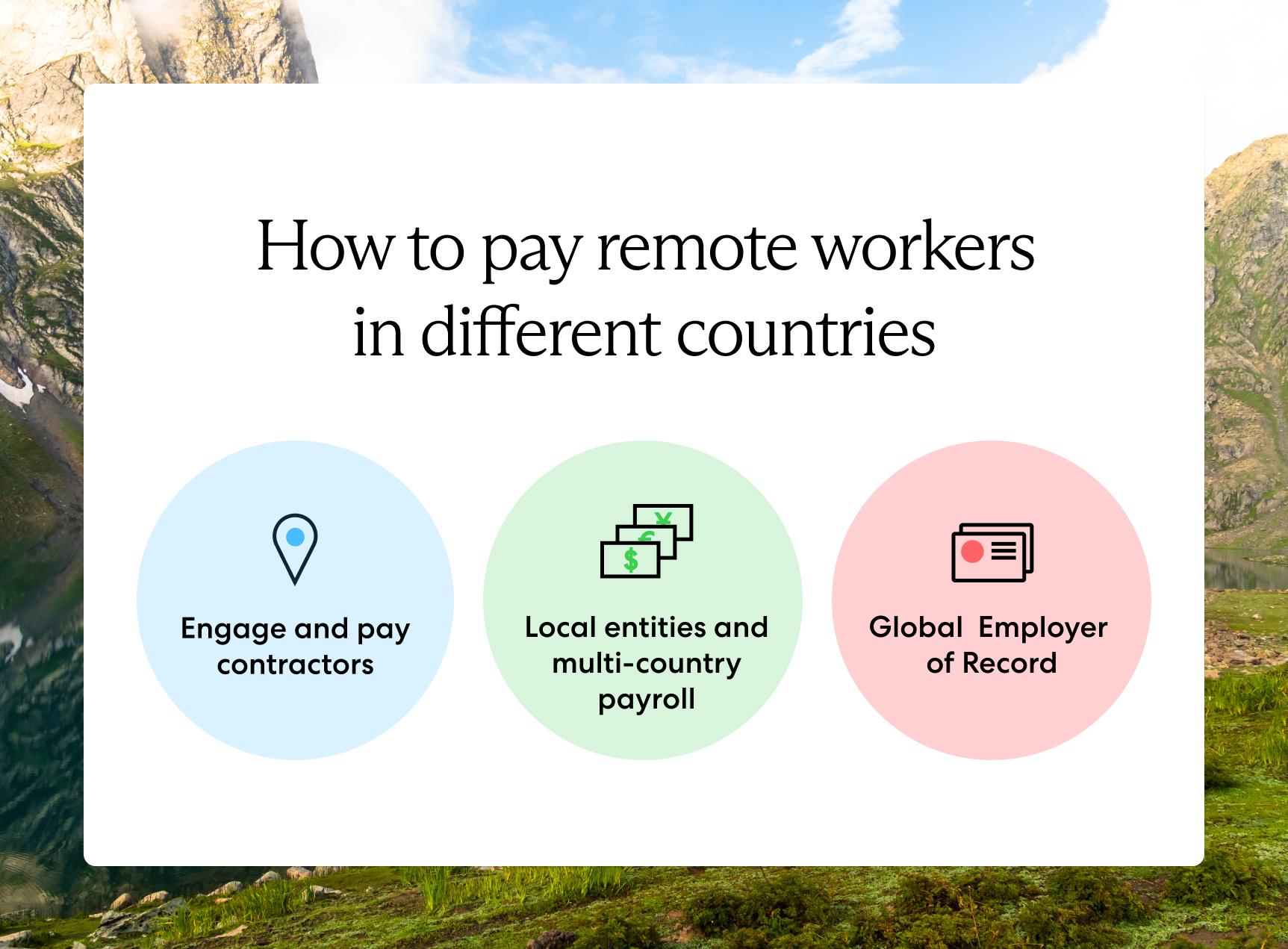Hiring remote workers in multiple countries has many advantages and challenges. As a company builds its global team, employers must understand their options for hiring international remote employees, as well as the different labor and payroll requirements within each country.
The following guide explains how to pay remote workers in multiple countries and navigate the challenges of paying a global workforce that spans international borders.
Benefits of hiring remote workers
If a company is looking for specific talent and skillsets, they are unlikely to find the most qualified employees in one convenient location. Some of the best talent may be found in other countries. By broadening the workforce search to include remote workers, an employer has access to more talent around the world that fits their exact needs.
Some benefits of hiring international remote workers include:
- Broader access to talent and skill sets
- Workforce across various time zones
- On-the-ground reps in foreign countries
- Exposure to various languages and cultures
- Expansion of resources and global presence
Challenges of hiring and paying remote workers in multiple countries
While having access to talent in multiple countries is a business-savvy move, many challenges come with hiring and paying workers across international borders.
Hiring employees in other countries requires navigating varying employment laws and unfamiliar payroll regulations. Failure to follow local country labor requirements and process compliant payroll can result in penalties, fines, and difficulty in hiring international workers in the future. Understanding the labor regulations of different countries and staying compliant with them is critical to hiring, paying, and maintaining a global workforce.
How to pay remote workers in different countries
Deciding where to build a team of international remote workers depends on many factors based on desired skills, available talent, logistics, and budget. Once a company outlines and understands its parameters, there are several options for hiring and paying remote workers in other countries:
1. Engage and pay contractors
Sometimes, a company requires additional talent for a specialized service or project but doesn’t want to add full-time employees to their team. Instead, engaging with and paying contractors often allows for more flexibility, efficiency, and cost savings.
In contrast with full-time employees, a contractor doesn’t need onboarding and allows for a simpler payment structure. Engaging with contractors also allows a company to test out a new foreign market for future growth opportunities.
However, while international contractors can be a convenient mechanism for accessing specialized talent when it’s needed, there are still some serious challenges. Classification laws vary from country to country, and employers must ensure their contractors are classified correctly, or they risk noncompliance. If a contractor is misclassified, the company may be subject to fines, legal fees, and reputation setbacks.
2. Set up local entities and use multi-country payroll
Generally, a company must establish an entity in a country if it wishes to hire and pay employees there. A company that has set up an entity in one or more foreign countries can outsource a multi-country payroll provider to pay its international employees. A multi-country payroll solution automates payroll for international employees, time, and expenses and makes it easier to accurately and compliantly pay a distributed workforce.
However, establishing an entity or branch in another country is a lengthy and expensive process. It might not make sense to set up an entity just for the purpose of hiring remote workers. Typically, entity establishment occurs when a company has broader plans to expand its global business presence.
3. Partner with an employer of record
If a company doesn’t have entities in the countries where its remote workers are located, or isn’t ready to establish an entity in another country, there are still ways to hire and pay employees in multiple countries. A company can circumvent the entity establishment process by partnering with a global employer of record (EOR).
A global EOR has global payroll capabilities and handles risk mitigation, local labor requirements, and compliance with various wages and payroll regulations in foreign markets. A global EOR is set up to locally hire, pay, and manage international, remote employees on a company’s behalf.
An EOR partner becomes the legal employer of a company’s supported employees and helps manage their distributed workforce around the world.
Learn more: What Is an Employer of Record (EOR)?
Start paying remote workers in 185+ countries
Hiring remote workers allows companies to target specialized skills and tap into the global market. While there are challenges that come with navigating different labor and payroll regulations in other countries, partnering with a global expert like Velocity Global can streamline the process.
Our global Employer of Record (EOR) solution helps you effortlessly and compliantly hire and pay talent in more than 185 countries without the need for foreign entity establishment.
And if you already have an entity, our Multi-Country Payroll platform ensures your distributed workforce continues to receive consistent, accurate, on-time payments.
Reach out to Velocity Global to learn more about how our workforce management solutions simplify paying remote workers around the world.
Topic:
Payroll




